Water Safety Goes Beyond The Swimming Pool
Water Safety Goes Beyond The Swimming Pool
When we hear about water safety, we tend to think it is a seasonal issue pertaining to children and swimming pools. Water safety goes way beyond the pool. It includes lakes, canals, ponds, and any other natural occurring body of water, plus areas in and around the house such as the bathtub, toilet and buckets. Anyone at any age can fall victim to a water tragedy.
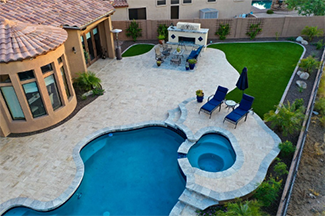 The Drowning Prevention Coalition of Arizona notes that teens and adults are just as susceptible to water-related incidents. Many factors contribute to drowning among this population:
The Drowning Prevention Coalition of Arizona notes that teens and adults are just as susceptible to water-related incidents. Many factors contribute to drowning among this population:
- Teens and adults have a tendency to overestimate their swimming abilities.
- Water conditions are underestimated (temperature, depth, unseen objects).
- Alcohol, drugs or medication are sometimes found to be a contributing factor.
- Life jackets are not being used.
But the most common element in adult water-related incidents is swimming alone. You are never old enough to swim by yourself. Kids are taught that they must have a supervisor and to “swim with a buddy” as they get older. The same is true for grown-ups. We have rules too.
- Never swim alone and never swim impaired.
- Always tell someone that you are going into the pool or hot tub.
- Do not take any medications – either prescription or over-the-counter medicines – that could make you feel drowsy before entering any body of water. If you’re not sure, check with your doctor.
- Never mix alcohol and water-related activity. The water temperatures in hot tubs can speed up the effects of alcohol.
Water Wing & Life Vests
Water Wings
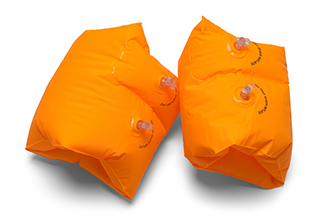 Don’t wing it when it comes to water safety. There is a misconception that water wings will prevent a child from drowning. The truth is, they offer a false sense of security.
Don’t wing it when it comes to water safety. There is a misconception that water wings will prevent a child from drowning. The truth is, they offer a false sense of security.
“Anything that you blow up is probably a toy,” says Lori Schmidt, public information officer, Scottsdale Fire and president of Drowning Prevention Coalition of Arizona. “They have a statement printed on the packaging that they are not a personal floatation device. Water wings are not a substitute for a life vest and supervision.”
Life jacket loaner program.
The DPCA has partnered with the Ryan Thomas Foundation and other state and local entities to establish life jacket loaner stations at several lakes and rivers. The stations are located near the dock and will allow boaters to use a life vest from the loaner station and return it at the end of the day.
Life vests can be purchased online and in many retail outlets for as little as $15. Some neighborhood fire departments distribute them for free.
“A life vest is a low investment in comparison to the safety of your child,” says Schmidt.
Don’t be Blue
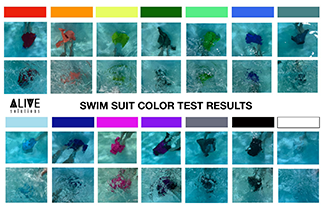 The Aquatic Safety Connection tells us to think bright and contrasting colors when it comes to bathing suits. This photo demonstrates colors visibility at the bottom of a pool. The top photo in each section is the fabric underwater, and the bottom photo is the fabric with surface agitation.
The Aquatic Safety Connection tells us to think bright and contrasting colors when it comes to bathing suits. This photo demonstrates colors visibility at the bottom of a pool. The top photo in each section is the fabric underwater, and the bottom photo is the fabric with surface agitation.
The bottom two colors are white and light blue. See how they disappear? Although the darker colors show up on a light pool bottom they can often be dismissed for a pile of leaves, dirt, or a shadow. Aquatic Safety Connection’s top choices would be neon pink and neon orange.
“Consider selecting a bright bathing suit, particularly if there is a pool party with a lot of people in the water, says Schmidt. “But the key is keeping eyes on children all the time. No distractions.”
Maintaining Pool Equipment
If you notice that any of the main drain and/or suction grates are missing loose and or damaged in any way, call a pool professional for guidance immediately.
It is critical to ensure that all pools and spas have drain covers that are compliant with the Virginia Graeme Baker Pool & Spa Safety Act (VGB Act) to avoid entrapment hazards, which occur when powerful suction from the water circulation system in a pool or spa causes someone to become trapped underwater. The law is named after Virginia Graeme Baker, a seven-year-old girl who died from drowning due to a suction entrapment from a faulty drain cover.
Old, unsafe drain covers are flat and create a strong circulation that can easily trap hair or a body part if they become blocked. New, safer drains are designed to be curved so that they can never be fully blocked by a body part. Parents should always confirm with pool and spa owners that they are using anti-entrapment drain covers before allowing children to get in the water. This video from the ZAC Foundation and Abbey’s Hope demonstrate the differences between a dangerous, non-compliant drain cover and a safer, compliant drain cover.
Who's Servicing Your Pool
When it comes to new pool installations, renovation, repairs, and/or pool maintenance, it is also important to hire a professional who is licensed, bonded, insured, and certified.
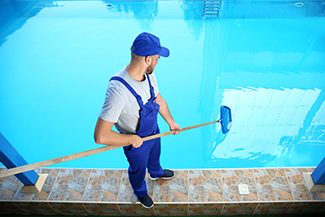 Don McChesney, general manager, Pentair - A&A Manufacturing, and president of the Pool & Hot Tub Alliance Central Arizona Chapter, suggests homeowners ask for referrals from other customers the contractor or service person has done work for. “Check their business rating with the BBB and license with the Arizona Registrar of Contractors. A licensed contractor is also required to be bonded and provide proof of insurance.”
Don McChesney, general manager, Pentair - A&A Manufacturing, and president of the Pool & Hot Tub Alliance Central Arizona Chapter, suggests homeowners ask for referrals from other customers the contractor or service person has done work for. “Check their business rating with the BBB and license with the Arizona Registrar of Contractors. A licensed contractor is also required to be bonded and provide proof of insurance.”
There are some phases of pool service and maintenance that may not require the company or individual to be a licensed contractor. If that is the case, you still want to protect your home and property. “Be sure they carry insurance in case they or any of their employees were to get hurt while performing services on your property,” says McChesney.
In addition to the license, hiring a professional who stays up to date on the latest technology, techniques, and pool laws and ordinances is key. Professionals who hold certifications such as Certified Pool Operator, Certified Pool & Spa Service Professional and others through the Pool & Hot Tub Alliance are required to continue their education to maintain their certification. That knowledge is used to service and maintain your large investment -- the pool.
Members of the Independent Pool & Spa Service Association are required to maintain liability insurance, at a minimum of $1,000,000 coverage and pass IPSSA’s Water Chemistry Certification Examination. Remember, it’s not just water the technician is dealing with. There are chemicals that if not handled and mixed properly can cause serious injury and damage.
Other Bodies of Water
Much of water safety circulates around pools. Keep your safety hat on when around other bodies of water, as well.
Lakes
The Red Cross recommends:
- Be sure you are water competent for natural environments before swimming – this is not your home pool!
- Always enter unknown or shallow water feet first.
- Watch out for currents, waves, and underwater obstructions – they’re not just found in the ocean.
- Additionally, never hang out or swim behind the boat. Gasoline-powered engines on boats, including onboard generators, produce carbon monoxide (CO), a colorless and odorless gas that can poison or kill someone who breathes too much of it, making them lose consciousness and silently drown.
Canals
- Don’t swim in canals – ever!
- Keep a safe distance from the edge of the canals.
- Canal sides are extremely slick, making it difficult to get out.
- Don’t let your kids be around canals without an adult.
- Stay away from automated equipment at water delivery gates.
- Never jump in to rescue pets or objects such as toys. Call 911 for help.
Around The House Water Safety Tips
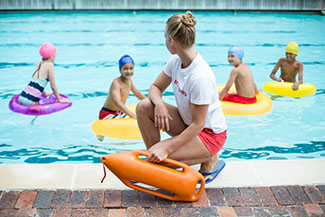 The DCPA promotes staying within an arm’s reach of a child when he or she is in or near the bathtub, toilet, pools, spas or buckets.
The DCPA promotes staying within an arm’s reach of a child when he or she is in or near the bathtub, toilet, pools, spas or buckets.
- Never leave your child alone or in the care of older children during bath time.
- Once bath time is over, immediately drain the tub.
- Empty all buckets, containers, and wading pools immediately after use. Store them upside-down and out of children’s reach.
- Keep toilet lids closed and use toilet seat locks.
- Never leave your child unattended in a tub or around any other body of water, even if he or she knows how to swim.
- Keep doors to bathrooms and laundry rooms closed.
- Children in baby bath seats and rings must be watched every second.
- Pets are not the only ones that fit through Doggie Doors, small children do too. Be sure the doggie door does not lead directly to the pool area.
Disclaimer: This is not a comprehensive list. Find more water safety tips at Drowning Prevention Coalition of Arizona , PoolSafely.gov and The Red Cross.
Regardless of whether you have a pool, take a few safety classes through the Red Cross. They offer CPR, first aid, water safety and many others.
Keep water safety top of mind all year long to keep you, your family, friends and pets safe.
Home Maintenance To-Do | Practice #WaterSafety
Podcast
Discussion of our EStore Product Of The Month, the SimpleSENCE Leak And Freeze Detector, our Weekly To Do on #WaterSafety, and what efflorescence is and how to remove it. Plus homeowner questions on glue suggestions for cabinet molding, getting rid of stains on a quartz countertop and a possible pipe leak in the slab.
###
Photo Credits:
- Aquatic Safety Connection
- Shutterstock
RELATED CONTENT:
- DIY FAQ: Let Safety Rule Around the Pool
- External Resource: Drowning Prevention Coalition of Arizona
- External Resource: PoolSafely.gov
- External Resource: Aquatic Safety Connection
- External Resource: Pool & Hot Tub Alliance
- External Resource: Independent Pool & Spa Service Association
- External Resource: Red Cross Water Safety
